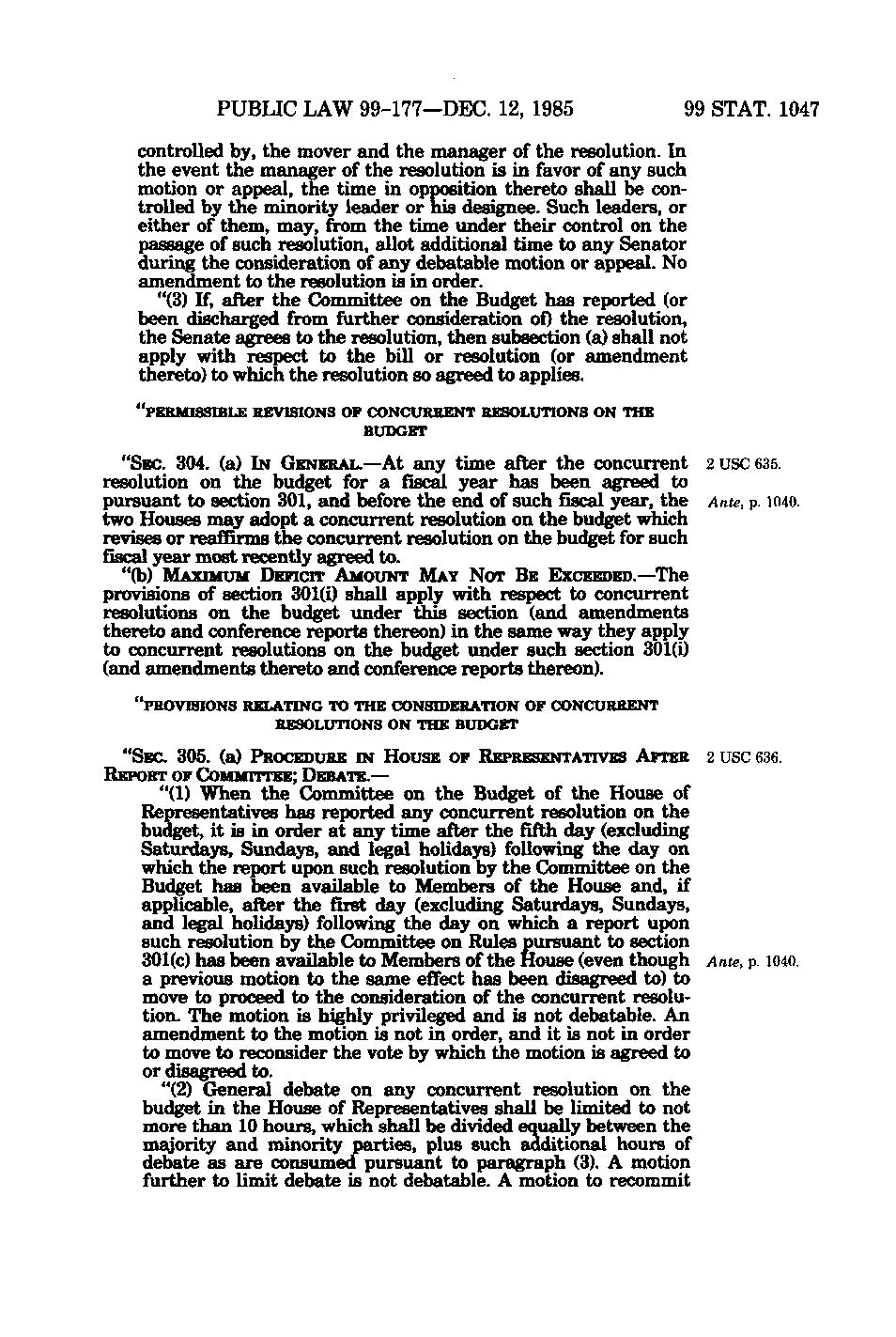PUBLIC LAW 99-177—DEC. 12, 1985
99 STAT. 1047
controlled by, the mover and the manager of the resolution. In the event the manager of the resolution is in favor of any such motion or appeal, the time in opposition thereto shall be controlled by the minority leader or his designee. Such leaders, or either of them, may, from the time under their control on the passage of such resolution, allot additional time to any Senator during the consideration of any debatable motion or appeal. No amendment to the resolution is in order. "(3) If, after the Committee on the Budget has reported (or been discharged from further consideration of) the resolution, the Senate agrees to the resolution, then subsection (a) shall not apply with respect to the bill or resolution (or amendment thereto) to which the resolution so agreed to applies. "PERMISSIBLE REVISIONS OF CONCURRENT RESOLUTIONS ON THE BUDGET
"SEC. 304, (a) IN GENERAL.—At any time after the concurrent 2 USC 635. resolution on the budget for a fiscal year has been agreed to pursuant to section 301, and before the end of such fiscal year, the Ante, p. 1040. two Houses may adopt a concurrent resolution on the budget which revises or reaffirms the concurrent resolution on the budget for such fiscal year most recently agreed to. "(b) MAXIMUM DEFICIT AMOUNT MAY NOT B E EXCEEDED.—The
provisions of section 301(i) shall apply with respect to concurrent resolutions on the budget under this section (and amendments thereto and conference reports thereon) in the same way they apply to concurrent resolutions on the budget under such section 301(i) (and amendments thereto and conference reports thereon). "PROVISIONS RELATING TO THE CONSIDERATION OF CONCURRENT RESOLUTIONS ON THE BUDGET "SEC. 305. (a) PROCEDURE IN HOUSE OF REPRESENTATIVES AFTER REPORT OF COMMITTEE; DEBATE.—
2 USC 636.
"(1) When the Committee on the Budget of the House of Representatives has reported any concurrent resolution on the budget, it is in order at any time after the fifth day (excluding Saturdays, Sundays, and legal holidays) following the day on which the report upon such resolution by the Committee on the Budget has been available to Members of the House and, if applicable, after the first day (excluding Saturdays, Sundays, and legal holidays) following the day on which a report upon such resolution by the Committee on Rules pursuant to section 301(c) has been available to Members of the House (even though Ante, p. 1040. a previous motion to the same effect has been disagreed to) to move to proceed to the consideration of the concurrent resolution. The motion is highly privileged and is not debatable. An amendment to the motion is not in order, and it is not in order to move to reconsider the vote by which the motion is agreed to or disagreed to. "(2) General debate on any concurrent resolution on the budget in the House of Representatives shall be limited to not more than 10 hours, which shall be divided equally between the majority and minority parties, plus such additional hours of debate as are consumed pursuant to paragraph (3). A motion further to limit debate is not debatable. A motion to recommit
�
